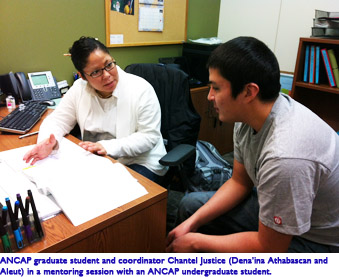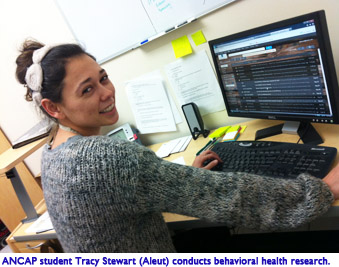Alaska Native Community Advancement in Psychology (ANCAP) program kicks off at UAA this fall
by Ted Kincaid |
 Concerning rates of depression, suicide, alcohol and drug use, school dropouts and
unintended pregnancies have been well documented in our Alaska Native populations.
A new program at UAA-Alaska Native Community Advancement in Psychology, or ANCAP-seeks
to improve the behavioral health legacy of Alaska's indigenous communities by focusing
on their strengths and increasing the number of Alaska Natives working in behavioral
health fields.
Concerning rates of depression, suicide, alcohol and drug use, school dropouts and
unintended pregnancies have been well documented in our Alaska Native populations.
A new program at UAA-Alaska Native Community Advancement in Psychology, or ANCAP-seeks
to improve the behavioral health legacy of Alaska's indigenous communities by focusing
on their strengths and increasing the number of Alaska Natives working in behavioral
health fields.
ANCAP evolved from its predecessor, ANPsych (Alaska Natives into Psychology), and
will maintain a similar mission. A key difference, though, is that ANCAP will have
a stronger emphasis on community, which is more consistent with the collectivistic
orientation of Alaska Native cultures. Not only does ANCAP encourage successful graduates,
it also encourages students to give back to their communities while they are students
and after graduation.
About 20 percent of Alaskans claim Alaska Native heritage, but just 4 percent of UAA
psychology graduates and 8 percent of psychology majors are Alaska Native.
ANCAP exists to grow these numbers-increasing the number of Alaska Natives that graduate
with a degree in psychology, work in the behavioral health field or pursue graduate
degrees in psychology or a behavioral health-related field. It also seeks to improve
levels of collective self-esteem among Alaska Natives; change society's perceptions
and regard of Alaska Natives and their communities; increase the number of Alaska
Natives conducting behavioral health research in collaboration with Alaska Native
communities; and grow the number of Alaska Natives providing behavioral health services
to Alaska Native communities.
The program-which just launched this fall semester-has about 35 undergraduate and
graduate student members, and that number is expected to double by the end of the
academic year in May 2013.
ANCAP student Tina Marie Woods, who earned her M.S. in clinical psychology from UAA
in 2010, says, "There is something special about being a part of a group of Alaska
Native students who carry the same mission: to humbly serve, seek mentorship with
elders and integrate their wisdom into academia to act as a tool and empower our people
to help themselves." Tina-of Unangan (Aleut) heritage-is currently working toward
her doctorate in clinical-community psychology at UAA while working for Aleutian Pribilof
Islands Association.
ANCAP's services and programs will adhere to the principles of community psychology-a
branch of psychology devoted to preventing health issues and promoting wellness in
a manner that is in stark contrast to the deficit-based, individual-focused and clinic-based
approaches of conventional clinical psychology. "This community-based approach is
more likely to produce positive and lasting results," says Assistant Professor of
Psychology E.J. David, director of ANCAP.
ANCAP's guiding principles are:
1. Contextual Embeddedness;
2. Appreciation of Diversity;
3. Strength-Based Perspective; and
4. Embracing Social or Environmental Change. "The program's research and services will reflect these 'CASE' principles in its efforts
to address behavioral health issues and promote wellness by enhancing cultural pride
and connectedness among Alaska Native communities," David says. "The term 'community'
really needed to be a part of the program's name, which necessitated the chance from
ANPsych to ANCAP." (Read more about David-also a UAA alumnus-in his I AM UAA profile. )
"The program's research and services will reflect these 'CASE' principles in its efforts
to address behavioral health issues and promote wellness by enhancing cultural pride
and connectedness among Alaska Native communities," David says. "The term 'community'
really needed to be a part of the program's name, which necessitated the chance from
ANPsych to ANCAP." (Read more about David-also a UAA alumnus-in his I AM UAA profile. )
Because of community needs and ANCAP's potential to address such needs, many private
entities have provided their support, including the Arctic Slope Regional Corporation,
Doyon Limited and the Arctic Slope Community Foundation. ANCAP also received support
from the UAA Center for Addressing Health Disparities through Research and Education
(CAHDRE) and the UAA Center for Community Engagement and Learning (CCEL).
To learn more about the psychology programs at UAA, visit www.uaa.alaska.edu/psych,
and for more information on the ANCAP program, contact E.J. David at (907) 786-6778
or ejrdavid@uaa.alaska.edu.
 "Alaska Native Community Advancement in Psychology (ANCAP) program kicks off at UAA
this fall" is licensed under a Creative Commons Attribution-NonCommercial 4.0 International License.
"Alaska Native Community Advancement in Psychology (ANCAP) program kicks off at UAA
this fall" is licensed under a Creative Commons Attribution-NonCommercial 4.0 International License.









